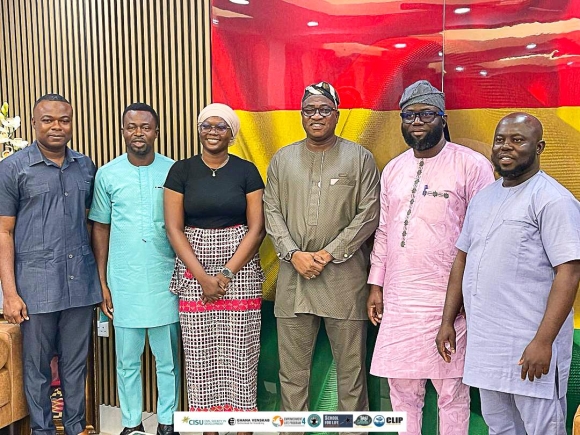Ministers applaud NGO’s climate action and community resilience work
Ministers applaud NGO's climate action and community resilience work in Northern Ghana

Two Ministers have commended Changing Lives in Innovative Partnerships (CLIP), a Tamale-based non-governmental organisation, for its dedicated efforts in tackling climate change and promoting sustainable livelihoods in northern Ghana.
During separate engagements in Accra, the Minister for Environment, Science, Technology and Innovation, Dr Ibrahim Murtala Muhammed, and the Minister of State in charge of Climate Change and Sustainability, Mr Seidu Issifu, praised CLIP’s impactful work—particularly its role in empowering vulnerable farming communities through climate-resilient strategies and inclusive development initiatives.
The meetings formed part of CLIP’s advocacy efforts under the Empowerment for Life (E4L) Programme, aimed at supporting climate-vulnerable communities to adopt effective adaptation measures that enhance agricultural productivity and livelihood security.
Partnership
The discussions focused on CLIP’s three decades of community-focused interventions, its current emphasis on climate resilience, and the government’s programmes and policies to mitigate climate change.
Both parties explored avenues for partnership to strengthen action and policy implementation at the grassroots level.
Leading the delegation, the Director of CLIP, Mr Lukman Yussif, stressed the need for stronger collaboration between government and civil society in climate policy formulation.
He noted that national programmes must reflect the needs and realities of rural populations, who are most affected by climate change.
“For climate policies to be effective, they must include the perspectives of the people most affected—smallholder farmers and rural communities. CLIP is committed to working with government to ensure adaptive strategies are inclusive, practical and sustainable,” he stated.
Also present at the engagement was Mr Abdallah Mohammed, Technical Advisor for Food Security, Climate Change and Resilience under the E4L Programme.
He emphasised the importance of integrating the concerns of vulnerable groups into national planning frameworks, including the National Adaptation Plan and the Medium-Term Development Plans of Metropolitan, Municipal and District Assemblies (MMDAs).
Pledge
In his response, Dr Muhammed commended CLIP for its longstanding contribution to sustainable development in northern Ghana.
He acknowledged the critical role of civil society in addressing climate change, stating:
“Government alone cannot solve this crisis. We need strong partnerships with organisations like CLIP to make a meaningful impact.”
For his part, Alhaji Issifu expressed particular interest in CLIP’s work on renewable agriculture and sustainable livelihoods.
He pledged his ministry’s commitment to collaborating with CLIP in the fight against climate change, adding that a Climate and Sustainability Relationship Framework had been established across all government ministries to coordinate efforts through a technical working group.
Background
The Empowerment for Life (E4L) Programme is being implemented in the Northern, North East and Savannah Regions by four local partners—Ghana Developing Communities Association (GDCA), School for Life, CLIP and YEFL-Ghana—with funding from Civil Society in Development (CISU) through Ghana Venskab, a Danish development organisation.
The programme seeks to strengthen civil society’s contribution to improved community resilience, equity and accountable governance across northern Ghana.



